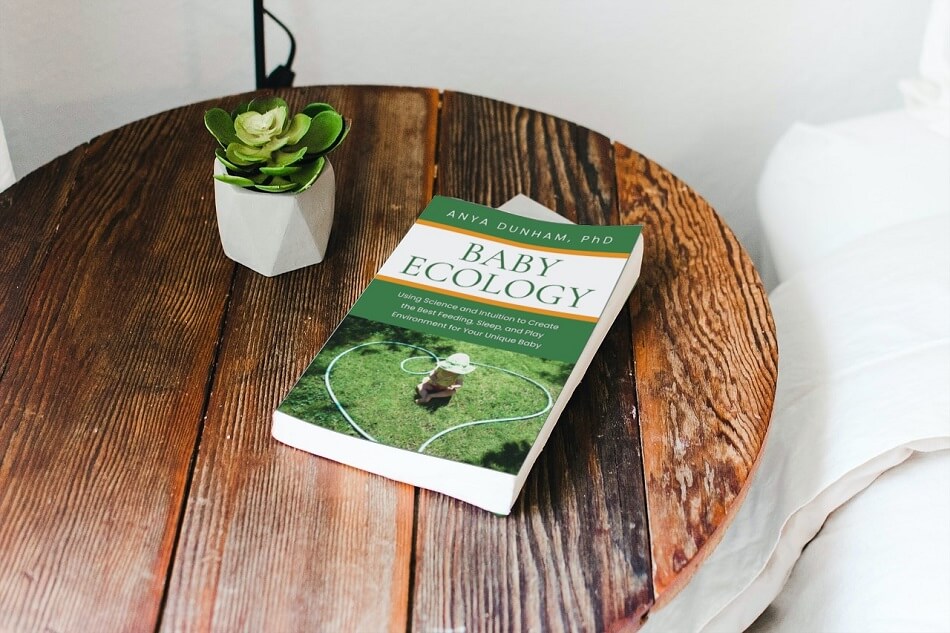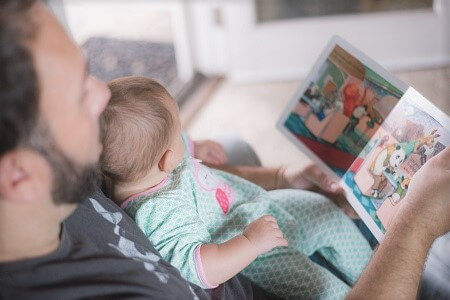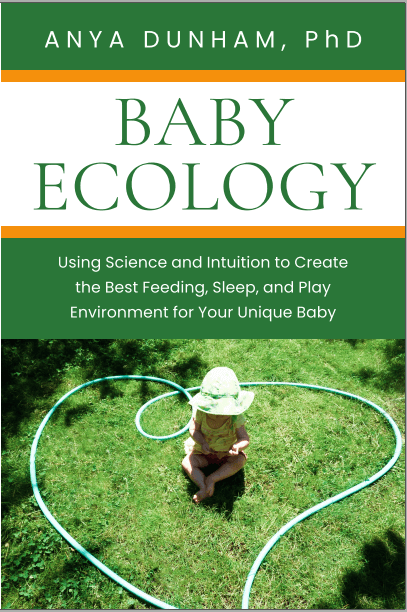Baby Ecology book is here! Learn more
Baby Ecology book is here!
- Home
- Maternal instinct myth
- Parenting with a partner
Parenting together: 3 things partners can do to support each other
by Anya Dunham, PhD
For millennia and across cultures, birth, postpartum, and baby care has been women’s work… but never the work of one woman (or any person) alone. Research points to 3 things that can make parenting together easier.

*Most of the research I cite here, and most of the research on division of labour and responsibility in parenting, has been done on heterosexual couples. However, I believe that the 3 main takeaways can help any family and parenting arrangement, and still apply to situations when your parenting partner is an extended family member or a nanny.
The work of parenthood
In Western societies, the 1960s, when many mothers didn’t work outside the home, are sometimes thought of as family-oriented years. Today, the dual-income family is much more common, and working parents often feel guilty for not being able to spend more time at home. Yet studies across 16 Western countries show that today’s parents spend more face-to-face time with their children than those in the 1960s did.1-3
We live with the cultural expectation of “intensive” parenting.4 Today’s parents preserve and even increase the time they devote to their children by cutting down on their own leisure activities. And the number-one such “leisure” activity is… sleep.2
This trend — increasing the time we spend with our children — is true for both mothers and fathers. Fathers today are doing more housework and spending more time with their children than the fathers of the 1960s, ’70s, and ’80s. But the gender gap remains: studies consistently show that on average, mothers are doing more work — and feeling more of the stress — that comes with parenthood.2,5
A recent study5 focused on heterosexual, highly educated, dual-income couples before and after they had their first baby. This study took place in the United States where most women return to work a few weeks after giving birth, and used a time diary method: mothers and fathers carefully logged everything they did over the course of each day working and parenting together. Before baby’s birth, women on average spent 15.5 hours on housework and 42 hours on paid work per week, whereas men spent 14 and 45 hours, respectively; their total workload was comparable: 57.5 hours for women and 59 hours for men. But after baby, women carried the majority of the increased workload of parenthood: their load increased by 3 hours a day, whereas for men the increased was about 40 minutes a day. Interestingly, both men and women felt their work increased by over 4 hours; had the researchers relied on questionnaires instead of time diaries, they would have found no gender gap.
Why do moms tend to shoulder more?
Public policy: Of the 41 countries surveyed by the Pew Research Center in 2018, paid leave for fathers was available in 34 of them, but most offered only 2 weeks’ leave or less.6 It can be difficult for fathers to become fully engaged when they don’t spend a significant amount of time with their babies.
To get truly involved and attuned, all parents need time and practice through day-by-day caregiving. One study compared mothers’ and fathers’ abilities to recognize their own baby’s cry among the cries of other babies. Who do you think did better? Actually, mothers and fathers did equally well... but only if they routinely spent at least 4 hours a day with their baby.7 Another study showed that in gay male couples, the primary-caregiver fathers — the partners who provided most of the baby care — had the same brain patterns as primary-caregiver mothers in heterosexual couples.8 These studies tell us that the key to engaged parenting is not gender but the time put into — and responsibility felt for — the day-by-day caregiving.
The way housework is commonly managed within families: In general, men tend to look after tasks that are relatively flexible, like yard work and repairs. And women often take care of the more routine and less flexible tasks like cooking, cleaning, and laundry.9 These need to be done daily or multiple times a day, often at specific times, requiring multitasking when also looking after kids. So mothers tend to multitask10 and feel more stressed.11

Multitasking is stressful because of the way the human brain handles it. In short, it doesn’t! Our brains can only focus on one thing at a time. It might seem like you’re accomplishing multiple things at the same time, but what you are really doing is quickly shifting your attention from one thing to the next which can be taxing — and stressful.12
Gatekeeping: Sometimes mothers themselves — usually unintentionally and unconsciously — stand in the way of partnership in parenting. They 'gatekeep', undermining and limiting their partner’s opportunities for caring for the children and the home. Sometimes it stems from the maternal instinct myth: the belief that women are 'naturally' better at raising children. Mothers are more likely to gatekeep when they carry all the “mental load” or “worry work” of parenthood,13 when they’re anxious, when they hold excessively high expectations for the fathers’ parenting, when they feel their relationship is unstable, and when fathers lack in skill and/or confidence.14-16
To be honest, when I first read the research on gatekeeping, I felt angry; it seemed the blame has been, once again, shifted to the mothers. But as I thought about it more, I felt that it can be helpful to identify this pattern in a family, and then be able to discuss without shame or blame. If you feel that you or your partner might be gatekeeping, think about why this pattern might have emerged. More than one reason listed above might apply to your situation.
3 things to make parenting together easier
Whether you are reading this as you prepare to welcome your baby or your baby is already here, think about how you can incorporate the following three ideas into your way of parenting together.
1. Learn together
When only one partner carries all the mental load of parenthood — anticipating needs, obtaining knowledge, identifying options, making decisions, and essentially being "the manager" of the family — it can be hard for them not to impose their insights or standards on the other partner. This can lead to gatekeeping.
Gatekeepers might do everything themselves or look over their partner’s shoulder, giving directions and subtly (or directly) criticizing how they interact with and care for the baby.
Gatekeeping can become a vicious cycle because the other partner backs off thinking they’ll never get it right; they engage less with the baby and feel less and less confident. At the same time, the gatekeeper is likely to feel overworked, exhausted, alone, and as if they are responsible for any and all mistakes.
To avoid gatekeeping, learn together by looking for evidence-based knowledge and by observing your baby. Share what you’ve learned and noticed. Take the time to discuss anything you disagree on; try to agree on big issues, especially those related to your baby’s health and safety.

2. Work together — but also apart
Usually one partner — often, though not always, mom — spends more time with the baby. For the primary caregiver to get a break, and for the other partner to be truly involved, it helps to put some of the daily parenting tasks under the partner’s full responsibility.
When they consistently and fully take care of a task — for example, dinner or bath time — without having to be asked or reminded and from start to finish, the primary caregiver can truly let go of the task, physically and mentally.
If you choose to go this route in parenting together, both you and your partner will need to accept that the other person might do things differently. Not necessarily better or worse, but differently. Whoever’s in charge of a task must have space to make their own decisions, not just execute the decisions made for them. And neither partner should look over the other’s shoulder or perceive their version as “less than.”
If you are parenting together with a partner and have a baby or young child... here is a question. When you are all in one room together, do you tell each other when you're about to step out? Do both of you do it or only one of you? The person who does is assuming responsibility fully.

3. Appreciate each other
Should you make a special effort to distribute the parenting load equally? Probably not. Your and your partner’s commitments outside your home, the needs of your baby, and your own needs and perceptions will continue to change, making it difficult, if not impossible, to be exactly the same amount of involved.
What matters is how you both feel about it. When it comes to housework, it’s often not the unequal division of labour that causes conflict, but the lack of recognition and appreciation.17 Perhaps the same is true for parenting together. Remember to notice what your partner does and to thank them.
And when it comes to emotional work of raising children, I once heard that partners should strive not for 50:50, but for 100:100. Connect with your baby fully and love her with all your heart; notice when your partner does the same.
You might also be interested in:
References
References
1. Sayer LC, Bianchi SM, Robinson JP (2004) Are parents investing less in children? Trends in mothers' and fathers' time with children. American Journal of Sociology 110(1): 1-43
2.Gauthier AH, Smeedeng TM, Furstenberg FF (2004) Are parents investing less time in children? Trends in selected industrialized countries. Population and Development Review 30(4): 647-671
3. Dotti Sani GM, Treas J (2016) Educational gradients in parents' child-care time across countries, 1965-2012. Journal of Marriage and Family 78(4): 1083-1096
4. Ennis LR (2014) Intensive mothering: the cultural contradictions of modern motherhood. Demeter Press, Bradford, ON, Canada
5. Yavorsky JE, Dush CMK, Schoppe-Sullivan SJ (2015) The production of inequality: the gender division of labor across the transition to parenthood. Journal of Marriage and Family 77(3): 662-679
6. Organization for Economic Cooperation and Development (2018) OECD Family Database https://www.oecd.org/els/soc/PF2_1_Parental_leave_systems.pdf (accessed on June 24, 2021)
7. Gustafsson E et al (2013) Fathers are just as good as mothers at recognizing the cries of their baby. Nature communications 4(1): 1-6
8. Abraham E et al (2014) Father's brain is sensitive to childcare experiences. Proceedings of the National Academy of Sciences 111(27): 9792-9797
9. Twiggs JE, McQuillan J, Ferree MM (1999) Meaning and measurement: reconceptualizing measures of the division of household labor. Journal of Marriage and Family 61(3): 712-724
10. Craig L (2007) Is there really a second shift, and if so, who does it? A time-diary investigation. Feminist Review 86(1):149-170
11. Offer S, Schneider B (2011) Revisiting the gender gap in time-use patterns: multitasking and well-being among mothers and fathers in dual-earner families. American Sociological Review 76(6): 809-833
12. Spink A, Cole C, Waller M (2008) Multitasking behavior. Annual Review of Information Science and Technology 42(1): 93-118
13. Daminger A (2019) The cognitive dimension of household labor. American Sociological Review 84(4):609-633
14. Fagan J, Barnett M (2003) The relationship between maternal gatekeeping, paternal competence, mothers' attitudes about the father role, and father involvement. Journal of Family Issues 24(8): 1020-1043
15. Schoppe-Sullivan SJ et al (2015) Who are the gatekeepers? Predictors of maternal gatekeeping. Parenting: Science and Practice 15(3): 166-186
16. Schoppe-Sullivan SJ, Fagan J (2020) The evolution of fathering research in the 21st century: persistent challenges, new directions. Journal of Marriage and Family 82(1): 175-197
17. Ruppanner L, Brandén M, Turunen J (2017) Does unequal housework lead to divorce? Evidence from Sweden. Sociology 52(1): 75-94
Using hundreds of scientific studies, Baby Ecology connects the dots to help you create the best environment for sleep, feeding, care, and play for your baby.
Warmly,
Anya


